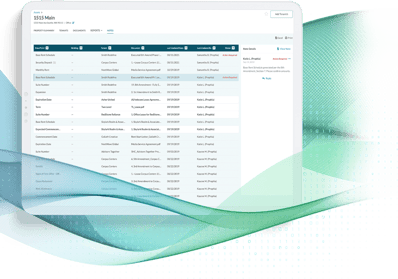Navigating the Digital Revolution: Embracing Technology in CRE Portfolio Intelligence
Discover how AI is transforming industries, from healthcare to retail. Learn why CRE, a trillion-dollar market, is ripe for disruption. Explore AI's potential to streamline tasks, improve budgeting, and unlock investment opportunities.

Innovation comes in many forms to meet different needs. It varies from industry to industry, and has a curious way of reflecting the values of the present time. Take grocery shopping, for example. Thanks to online shopping, shoppers have grown accustomed to a level of convenience that has never existed and expect quality now more than ever.
With necessities like toilet paper, paper towel, non perishables, and home goods available for purchase online, we very well could see the footprint of brick-and-mortar grocery stores shrink to support higher quality produce and meat sales. This is just one example of innovation running counter to a current state of affairs to support future needs.
In commercial real estate, another market in flux, there is a current state of affairs, an inefficient status quo, that is inspiring a growing need for innovation to support future investments and stakeholders in this trillion-dollar industry.
But just what could a renaissance in commercial real estate look like? Does it involve divesting in a certain asset class? Or perhaps ramping up sustainability efforts? In addition to these two strategies, we also believe technology will play a more meaningful role than ever before.
Jump To A Section in This Article
The Rise of Machine Learning & AI
Making the Case for Digital Transformation in CRE
Finding the Right AI Solution for Your Team
Prophia: Empowering CRE Transformation
The Rise of Machine Learning, Generative AI, and Automation
As we step into 2023, it's clear that AI is dominating conversations, but its roots run deeper than one might think. While we're not delving into AI's history as far back as the 1960s with ELIZA, a 2018 Gartner poll surveyed CIOs across different industries, revealing that over 60% of respondents anticipated some AI utilization within their companies by 2020.
This underscores AI's longstanding presence on executives' radars, and its current widespread adoption across industries highlights which sectors have successfully embraced it and which are lagging behind.
Healthcare AI Adoption.
Healthcare may not be the first out of the gate with technology adoption, but it may be the fertile ground AI needs to effectively prove its worth. Already the National Bureau of Economic Research has projected $200 billion in savings on healthcare costs from gradual AI adoption across the industry over the next five years. Additionally, many experts see healthcare AI as a means for improving care quality, personalization, and overall clinical satisfaction.
AI Adoption in Retail.
We have written at length about the exciting trends happening in the retail sector—even going so far as to enhance our own AI platform to better support retail leases and property operations. Retail is another leading industry that is finding its own relevant use cases for AI. Industry experts project that 50% of inventory management in retail will be automated by AI as will 53% of customer intelligence. These innovations alone will have the power to vastly change the retail landscape from the way it looked five years ago.
AI Adoption in Other Major Industries.
Unsurprisingly, finance has also started to shift administrative tasks onto AI’s plate with 36% of IT executives in banking reporting “heavy use” AI for portfolio management. Additionally, 17% plan to use AI in the coming 1-3 years for personalizing investments.
The manufacturing sector is a massive data generator, which makes it a key candidate for AI adoption. Deloitte reports 93% of manufacturing companies believe AI will drive growth and innovation in the sector and AI adoption has posted an impressive 40% year-over-year growth consecutively since 2019.
Similarly in the energy and utilities industry, AI adoption reached 22% in 2020 and showed signs of continuing to increase as grid optimization and predictive maintenance prove to be cost-efficient practices.
Making the Case for Digital Transformation in Commercial Real Estate
For a $21 trillion industry with investor interest slowing in certain asset classes and picking up in others, the commercial real estate sector is primed for cre data analytics to improve the speed of deal execution, effectively manage assets at various stages of the lease lifecycle, and renew confidence among investors. But that’s just the tip of the iceberg. A widespread asset digitization in CRE holds greater promise than simply streamlined data management.

Improved Budget Management.
According to an IDC survey, 75% of CRE owners came in over their planned budget and 70% were late. In a global market where venture and investor capital has slowed, wrangling unruly budgets and taking a proactive approach to project timelines is one of the first avenues of process improvement that greatly reduces unnecessary costs. What’s more, AI’s ability to automate 80% of manual tasks and 70% of data processing tasks makes it a great option for closing human error gaps when managing project budgets and navigating timelines.
Fewer Time-Consuming Tasks.
Many of our own clients have expressed that many of their day-to-day lease and property management tasks are time-consuming, leaving them little time to interpret and synthesize the critical data points they need to make important economic decisions.
When a management company onboards a building, one of the most tedious tasks is getting through all of the leases and understanding who the tenants are and their lease obligations.
Lauren Crenshaw, Sr. Property Manager, Patrinely Group
With a simple integrated platform for data management, like Prophia, property managers, asset managers, and leasing administrators can greatly reduce the amount of time they spend manually sifting through leases and automate tasks like abstraction, encumbrance tracking, and critical dates management. Converting even a fragment of these manual tasks into automated ones can help move critical stakeholders’ focus away from administrative work and onto strategy.
 Mitigation of Complex Leasing Challenges.
Mitigation of Complex Leasing Challenges.
We have reported at-length about the office sector and investor interest slowing as urban offices remain largely empty in prominent markets around the country. But even CRE professionals managing office tenants through the tough decision to downsize or terminate a lease can leverage AI to track tenants rights, critical dates, amendments, and encumbrances to provide a tenant with complete answers and reliable insight throughout renewal conversations. This is just one example of AI’s ability to impact human business relationships and make a well-informed business decision that aligns with market conditions.
AI-Powered Analytics.
As investor enthusiasm cools, portfolio intelligence requirements continue to burn hot among various portfolio stakeholders. According to Northspyre, AI could be capable of automating 64% of data collection tasks, providing a serious lift to portfolio data aggregation. Thus, applying automation to real estate portfolio management data analytics and report generation seems like a natural way to meet the increased reporting requirements from investors and ownership groups while also maintaining accuracy across asset classes and lease complexity.
automating 64% of data collection tasks, providing a serious lift to portfolio data aggregation. Thus, applying automation to real estate portfolio management data analytics and report generation seems like a natural way to meet the increased reporting requirements from investors and ownership groups while also maintaining accuracy across asset classes and lease complexity.
Finding the Right AI Fit For Your Team
Not all AI solutions are created equal. In a landscape flooded with AI providers, it's essential to choose the right fit for your team's needs.
Vertical vs. Horizontal AI for CRE
Vertical AI solutions, like Prophia, shine with exceptional data precision. Unlike horizontal AI, which has a broader focus, vertical AI is finely tuned for specialized subjects, delivering highly accurate outputs tailored to industry nuances. Its targeted approach, leveraging domain-specific knowledge, allows rapid development and deployment for specific CRE tasks while maintaining customizability. In contrast, horizontal AI aims for broad understanding but may lack the depth and precision required for specialized CRE challenges.
Prophia: Empowering CRE's Digital Transformation
The current landscape of the commercial real estate (CRE) market, coupled with AI's widespread adoption across industries, presents a unique opportunity for CRE professionals. Many companies continue to rely on outdated manual practices for data management, which no longer suffice. Human errors and the significant time invested in tasks like lease abstraction and data aggregation for reports cannot match AI's speed and precision.
We firmly believe that AI should complement CRE professionals' abilities rather than replace them. Vertical AI solutions like Prophia, tailored to CRE's specific domain, fill this crucial role. They provide CRE professionals with the data control and accuracy necessary to make ROI-driven decisions and adapt to market changes.
After nearly five years of development using proprietary CRE data, the current version of Prophia leads in lease abstraction automation, customizable portfolio reports, and stacking plan digitization. Access to this clear, standardized, and refined data gives firms choosing to optimize their processes with vertical AI a competitive edge, enhanced business intelligence, and relief from economic pressures.
If your team is struggling to adopt the right AI solution for your portfolio management needs, Prophia can help. Reach out to a member of our team today to see how and get started.
Hannah Overhiser
Hannah is Prophia's Content Marketing Manager and a seasoned B2B and B2C marketer. Her career began in eCommerce consulting with a focus on code testing. This technical expertise transferred seamlessly to SEO and she started working agency-side as an SEO and Content Strategist. Today, her home is Prophia, and she puts...

